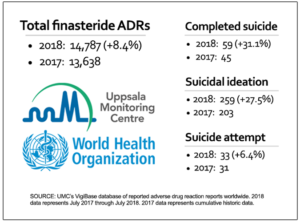Aug. 4, 2018
Dear Friends:
November 23 is a day I wish I could strike forever from the calendar. For it’s the anniversary of my son Randy’s death.
 And this coming November 23 will be particularly difficult, marking a decade since his passing.
And this coming November 23 will be particularly difficult, marking a decade since his passing.
On that day in 2008, despite my degrees from Johns Hopkins and Washington University School of Medicine, I knew little about finasteride’s potential to cause adverse reactions like anxiety, depression, sexual dysfunction, cognitive dysfunction and, yes, suicidal ideation.
I had only recently begun piecing together the connection between Randy’s finasteride prescription and the intense suffering he endured for more than a year.
Back then, there was scant literature linking the drug to persistent side effects, while the term “post-finasteride syndrome” had yet to enter the medical lexicon.
You can imagine how alone, how frustrated I felt trying to make scientific sense of my firstborn’s senseless suicide.
The loss of Randy will live with me forever. But today, when I reflect on how far we’ve come in terms of PFS awareness and research—while building a supportive community of patients, their loved ones and doctors worldwide—I feel certain that we’re moving in the right direction.
And that Randy is smiling, just a tad, at our daily, often successful efforts to spare other young men his fate.
Now, to mark the sixth anniversary of the PFS Foundation, I’d like to share some highlights from the past 12 months.
REGULATORY ACTIVITY
Authorities continue to warn consumers of finasteride’s potential dangers, while beginning to educate the medical and pharmaceutical communities accordingly.
 In October, France’s FDA equivalent, the National Agency for Drug Safety (ANSM), launched a public-awareness campaign about mood changes in Propecia patients, “particularly depression, and suicidal ideation.” Led by Caroline Semaille, director of anti-infective drugs, hepatogastroenterology and dermatology at ANSM, the campaign resulted in significant media coverage (see Media Awareness below).
In October, France’s FDA equivalent, the National Agency for Drug Safety (ANSM), launched a public-awareness campaign about mood changes in Propecia patients, “particularly depression, and suicidal ideation.” Led by Caroline Semaille, director of anti-infective drugs, hepatogastroenterology and dermatology at ANSM, the campaign resulted in significant media coverage (see Media Awareness below).
In May, the European Medicines Agency (EMA), which oversees the scientific evaluation, supervision and safety monitoring of pharmaceutical products throughout the European Union—and a year earlier mandated that finasteride packaging be revised to include warnings of depression and suicidal ideation—added anxiety to the list of possible adverse drug reactions (ADRs).
The EMA also directed its 31 member states to revise the labels of all finasteride products to include this new risk, with implementation scheduled to begin August 8.
A month later, in its Health Product InfoWatch, FDA-equivalent agency Health Canada (HC) disclosed that “New information regarding the risk of muscle-related disorders has been added to the Post-Market Adverse Drug Reactions and Consumer Information sections of the Canadian product monographs for Proscar and Propecia.”
And just last month, in cooperation with 28 local manufacturers and distributors of finasteride, including Merck & Company subsidiary MSD Sharp & Dohme GmbH, Germany’s FDA equivalent, the Federal Institute for Drugs and Medical Devices, dispatched a Red Hand Letter (English translation here) to doctors and pharmacists nationwide, informing them of severe and persistent finasteride ADRs.
In addition to France, Germany and Canada, we have to date identified six EMA members states and three nations outside Europe that have published warnings of PFS symptoms over the past two years: Argentina, Belgium, Croatia, Denmark, the Netherlands, New Zealand, Poland, South Korea and the United Kingdom.
To ensure we’re communicating directly with as many of the proper authorities as possible, we recently expanded our regulatory mailing list, adding 209 contacts throughout 125 countries, for a total of 663 contacts in 157 countries. From the General Directorate of Pharmaceutical Affairs in Afghanistan to the Medicines Control Authority in Zimbabwe, each nation will be apprised of any new finasteride-related action by any other nation, as well as news of PFS Foundation-sponsored medical research.
MEDICAL AWARENESS
Like regulatory authorities, more and more clinicians are not only recognizing PFS but validating the condition.
 Case in point, Charles J. Ryan, a Distinguished Professor of Clinical Medicine and Urology at the University of California, San Francisco, who in March published The Virility Paradox: The Vast Influence of Testosterone on Our Bodies, Minds, and the World We Live In. The book features a 10-page section titled The Business of Baldness and the Dangers of Baldness Correction, for which Dr. Ryan interviewed a number of PFS patients, including Lars of California.
Case in point, Charles J. Ryan, a Distinguished Professor of Clinical Medicine and Urology at the University of California, San Francisco, who in March published The Virility Paradox: The Vast Influence of Testosterone on Our Bodies, Minds, and the World We Live In. The book features a 10-page section titled The Business of Baldness and the Dangers of Baldness Correction, for which Dr. Ryan interviewed a number of PFS patients, including Lars of California.
“Propecia is a low-dose drug, and it was supposed to manipulate testosterone only in the scalp. Instead, it had done a number on Lars’s brain, bringing on episodes of depression, irritability, and aggression that changed his life,” writes Dr. Ryan. “[I]t’s biologically plausible that finasteride was causing these problems because we know that 5AR, the enzyme that converts testosterone into DHT—the enzyme blocked by finasteride—is heavily active in the parts of the brain known as the ‘reward pathways’… impairment of these circuits can lead to a lack of enthusiasm for things like sex and work.”
Similarly, Amr Raheem, an andrology specialist at University College London Hospitals, noted last fall on his private-practice website that “Propecia…side effects can be devastatingly serious. Neurological and physical symptoms such as muscle atrophy, chronic fatigue and depression have all been reported.… Erectile dysfunction, loss of libido, reduction of semen creation and curvature of the penis, known as Peyronie’s, are all part of this disturbing reaction.”
Also last fall, Wesley Lindquist, an internist at St. Cloud Hospital in Saint Cloud, MN, called to let us know how concerned he is about PFS, having personally seen a number of patients suffer from the condition. As such, he regularly counsels his colleagues against prescribing finasteride for any reason.
 Finally, Keshav Narain, an ophthalmology surgeon in San Jose, CA, wrote us three weeks ago to say: “I recently saw a patient on finasteride.… He obtained it without a prescription, through Hims. I believe that the vast majority of these individuals have no idea of the potential dangers of this medication. Aside from the known side effects that result from androgen blockade, we believe that a subset of patients end up with neurological effects.”
Finally, Keshav Narain, an ophthalmology surgeon in San Jose, CA, wrote us three weeks ago to say: “I recently saw a patient on finasteride.… He obtained it without a prescription, through Hims. I believe that the vast majority of these individuals have no idea of the potential dangers of this medication. Aside from the known side effects that result from androgen blockade, we believe that a subset of patients end up with neurological effects.”
Meanwhile, we continue to monitor and distribute ADR data for finasteride, housed in the World Health Organization’s VigiBase database, so that health care professionals, the general public and members of the media are aware of global trends. Sadly, all key indicators have risen year over year (July 2017 to July 2018), with suicidal ideation and completed suicide up double digits (see above right).
The absolute number of 1,149 new ADRs during this period translates into more than 95 per month, or more than 3 per day. And the absolute number of 14 suicides means that, over the past 12 months, 1.1 men per month have taken their own lives as a result of adverse reactions to finasteride.
PATIENT SUPPORT
The Patient Support section of our Resources page has for two years now listed doctors, psychologists and pharmacologists who volunteer to counsel PFS patients on managing their symptoms. Year over year, that list has grown from 51 to 66 (+29%), across 13 specialties in 19 nations.
From Rachel Rubin in Washington, DC, to Ralph Trüeb in Zürich to Néstor Orellana in Santiago to Dirk Michielsen in Brussels to Keong Tatt Foo in Singapore, we thank them one and all for their ongoing efforts to help PFS patients remain stable.
Meanwhile, our Patient Support program, designed to connect PFS patients worldwide for moral support and sharing potentially helpful coping strategies, remains one of our most popular resources. Since the program’s launch in September 2016, hundreds of afflicted men and their loved ones—who would otherwise have virtually no way of finding one another—are now in regular contact.
MEDIA AWARENESS
 ANSM’s public-awareness campaign warning against depression and suicidal ideation in Propecia patients generated widespread media attention in France, where the drug is prescribed to 30,000 men.
ANSM’s public-awareness campaign warning against depression and suicidal ideation in Propecia patients generated widespread media attention in France, where the drug is prescribed to 30,000 men.
In November, Dr. Semaille told the France 2 news magazine 20 Heures, “The addition to the [finasteride label] is a clear warning to patients about the possible occurrence of these side effects, advising them to stop taking the drug.”
And she told France 3 News, “Depressive disorders [stemming from finasteride] have not yet been formally established, but we have doubts and prefer therefore to inform the public.”
On the print side, Dr. Semaille hinted that the PFS population known to ANSM may just be the tip of the iceberg. “We know [these adverse drug reactions] are undervalued, because France does not have much pharmacovigilance reflex.…[W]orldwide, 508 serious psychiatric cases, including 25 suicides, have been identified,” she told daily newspaper Le Parisien (English translation here), also in November.
Four months later, the largest weekly newspaper in Germany—where 120,000 finasteride prescriptions were filled in 2017—took up the charge. “Using finasteride for hair loss is like shooting at sparrows with cannons,” Michael Zitzmann, a professor of andrology at Münster University Hospital, told Die Zeit. (English translation here). “[I]t blocks not only the super hormone but other hormones that affect thinking and psyche, mood and emotions. Discontinuation…should actually make the hormones work again…but apparently something breaks down in some men.”
Three months after that, the Swiss Radio and Television network pushed the PFS-awareness message even further in its weekly health-news magazine, Puls, with a special report titled Do Anti-Baldness Remedies Make You Impotent? (English-subtitled version here.) “We are certainly very cautious, because we see the side effects,” urologist Doris Mannhard told the show of finasteride. “We wouldn’t recommend that any man take the drug, especially not young men. The longer they take it, the greater the risk of experiencing persistent side effects.”
 Meanwhile, L’Obs, the most widely read news magazine in France, ran not one but two PFS features. Its 4,000-word November report, headlined Prescription Hair-loss Medication Propecia Accused of Ruining Lives (English translation here), focused on the 2016 suicide of 25-year-old PFS patient Romain Mathieu.
Meanwhile, L’Obs, the most widely read news magazine in France, ran not one but two PFS features. Its 4,000-word November report, headlined Prescription Hair-loss Medication Propecia Accused of Ruining Lives (English translation here), focused on the 2016 suicide of 25-year-old PFS patient Romain Mathieu.
L’Obs’ follow-up story, in July, took ANSM, the EMA’s Pharmacovigilance Risk Assessment Committee (PRAC) and MSD (the overseas subsidiary of finasteride manufacturer Merck & Company) to task for letting PFS proliferate.
“In 2007, Sweden asked MSD about a possible link between finasteride and depression. But it took until June 2017 for the accumulation of adverse drug reaction (ADR) reports…to push the PRAC to add ‘depression’ and ‘suicidal ideation’ to the warnings on the product insert,» wrote investigative reporters Camélia Echchihab and Emre Sari in a story titled Finasteride, the Controversial Drug that Medical Authorities Continue to Defend (English translation here).
“In April 2018, the PRAC decided to add the risk of anxiety to the insert. In 2013, however, the director of AFSSAPS (ANSM’s predecessor) claimed that these side effects were ‘well known,’ citing only passing sexual difficulties or issues.”
Here in the US, leading media outlets continue to amplify key PFS-awareness messages.
In a January article headlined Trump’s Male Pattern Baldness Drug—Demystified—complete with a link to the New Zealand Medicines and Medical Devices Safety Authority’s PFS page—the Daily Beast wrote: “[A] growing number of patients are reporting severe neurological side effects after taking finasteride‚ so many that the National Institutes of Health (NIH) recognizes post-finasteride syndrome on their list of genetic and rare diseases. Patients…have reported mental and neurological side effects, like depression, suicidal ideation, anxiety, and impaired memory, and have reported such symptoms even after several months of discontinuing the drug.”
Also in January, a Men’s Health story headlined What to Know About Propecia, President Trump’s Hair Loss Drug of Choice noted, “In 2017, a study from Northwestern University found that sexual side effects can hang with users long after they stop using the drug. The chances aren’t huge—only 1.4 percent of men on the drug developed persistent ED—but it continued, on average, for more than three-and-a-half years after they went off the drug.”
(For a complete listing of PFS news stories, please refer to our Media Awareness page.)
PATIENT ACTIVISM
 PFS is, needless to say, devastating to most men afflicted by the condition. Many tell us they’re unable to work more than a few hours a day, and even then find it hard to focus. There’s also the motivation issue—wrestling incessantly with questions like, What do I have to live for? and Why go on? But more and more, we’re hearing from those who, despite physical and mental anguish, vow to stand up, help and be heard. One such patient is 34-year-old Michael Adams of Connecticut. In 2010, while working in Manhattan as an editor at esteemed reference-book publisher Facts On File, he was struck by PFS. Then came the all-too-familiar cascade: losing friends, quitting job, moving home and searching in vain for effective medical treatments.
PFS is, needless to say, devastating to most men afflicted by the condition. Many tell us they’re unable to work more than a few hours a day, and even then find it hard to focus. There’s also the motivation issue—wrestling incessantly with questions like, What do I have to live for? and Why go on? But more and more, we’re hearing from those who, despite physical and mental anguish, vow to stand up, help and be heard. One such patient is 34-year-old Michael Adams of Connecticut. In 2010, while working in Manhattan as an editor at esteemed reference-book publisher Facts On File, he was struck by PFS. Then came the all-too-familiar cascade: losing friends, quitting job, moving home and searching in vain for effective medical treatments.
Eight years later, however, in March of this year—and despite a worsening condition—Michael staked out #MeTooPropecia on Twitter, shared his own story and invited others to share theirs. Since then, 20 fellow sufferers and their loved ones have done just that, while three media outlets have contacted him about running PFS feature stories.
“Building PFS awareness is tied directly to someday finding a cure. Doctors consume media just like everyone else, and learning about the condition via Twitter or other outlets can encourage them to investigate further,” Michael tells us. “Of course, I hope for a future where I’m no longer afflicted with PFS. But #MeTooPropecia is about more than my personal struggle. Even if I save just one man from this condition, that’ll be an enormous victory.”
CLINICAL STUDIES
 Researchers conducting PFS Foundation-sponsored studies continue to see their work appear in major medical journals. In April, Roberto Melcangi, head of the Neuroendocrinology Unit in the Department of Pharmacological and Biomolecular Sciences at the University of Milano, published a new paper in Endocrine: International Journal of Basic and Clinical Endocrinology. Titled Post-finasteride syndrome and post-SSRI sexual dysfunction: two sides of the same coin?, the nine-page review discusses the knowledge accumulated so far on the pathological phenotype of PFS and of post-SSRI sexual dysfunction (PSSD). “Sexual dysfunction is a feature shared by PFS and PSSD,” writes Prof. Melcangi. “This common aspect could…be useful to understand the pathophysiology and to possibly design therapeutic strategies.»
Researchers conducting PFS Foundation-sponsored studies continue to see their work appear in major medical journals. In April, Roberto Melcangi, head of the Neuroendocrinology Unit in the Department of Pharmacological and Biomolecular Sciences at the University of Milano, published a new paper in Endocrine: International Journal of Basic and Clinical Endocrinology. Titled Post-finasteride syndrome and post-SSRI sexual dysfunction: two sides of the same coin?, the nine-page review discusses the knowledge accumulated so far on the pathological phenotype of PFS and of post-SSRI sexual dysfunction (PSSD). “Sexual dysfunction is a feature shared by PFS and PSSD,” writes Prof. Melcangi. “This common aspect could…be useful to understand the pathophysiology and to possibly design therapeutic strategies.»
Three months earlier, we announced Phase II of the PFS clinical research being conducted by Prof. Melcangi. This new study will evaluate (a) in PFS patients, possible epigenetic changes in the 5-alpha-reductase enzyme, and (b) in an animal model of PFS, behavioral parameters, and alterations in neurogenesis, neuroinflammation and neurotransmitter pathways involved in the control of sexual function, as well as possible epigenetic changes in 5-alpha-reductase.
Meanwhile, our clinical study at Baylor College of Medicine has progressed significantly this year. As soon as it’s published, we’ll announce the results.
(For a full directory of PFS-related studies, please visit our Medical Literature page.)
FDA PIPELINE
 In addition to funding PFS studies, we monitor FDA trials for potentially promising products in clinical development. Sage Therapeutics has allopregnanolone and allopregnanolone analogue products that are currently in trials for various indications, including major depressive disorder and insomnia.
In addition to funding PFS studies, we monitor FDA trials for potentially promising products in clinical development. Sage Therapeutics has allopregnanolone and allopregnanolone analogue products that are currently in trials for various indications, including major depressive disorder and insomnia.
In June, Sage announced an expedited development plan for SAGE-217 following a Breakthrough Therapy meeting with the FDA. The plan is intended to support a potential filing for approval of SAGE-217 in the US for the treatment of major depressive disorder (MDD) and postpartum depression (PPD).
“SAGE-217, if successfully developed and approved, may rewrite the textbook on how the tens of millions of people suffering from MDD are treated, ultimately turning depression into a disorder, not an identity,” said Sage CEO Jeff Jonas.
As we embark on year seven of our mission to fund PFS research, generate PFS awareness and offer support to PFS patients, I ask you to continue giving generously to the foundation so that we may continue this critical work.
In the meantime, if you or a loved one is suffering from PFS and feeling unstable, please don’t hesitate to notify us via our Patient Support hotline: social@pfsfoundation.org
Sincerely,
John Santmann, MD
CEO

